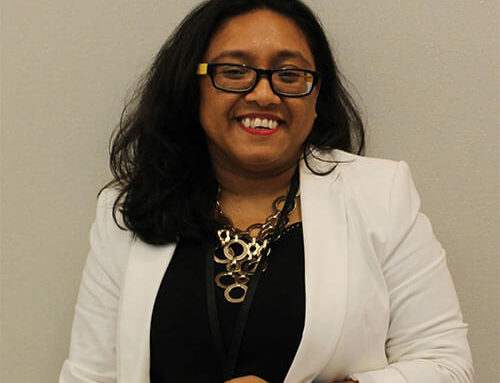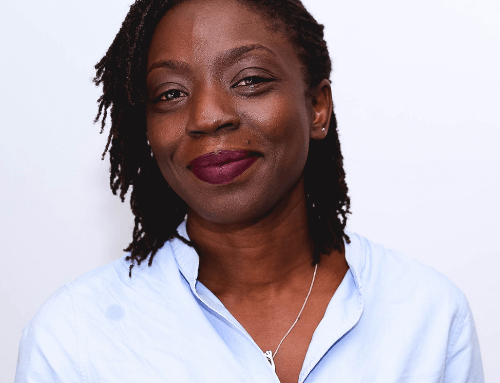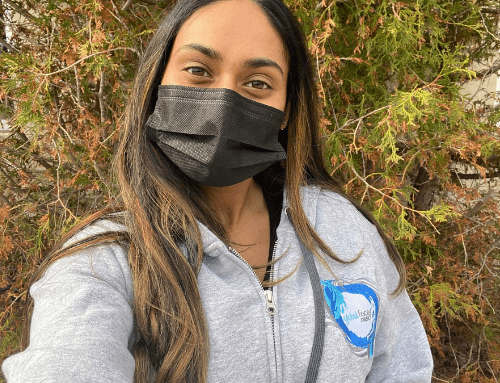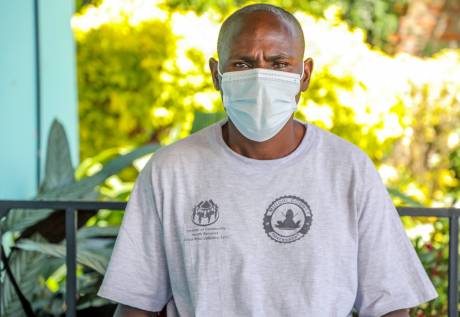
by Melina Kalamandeen
A year ago, we faced the beginning of one of the worst public health emergencies in over a century with barely any information on how the new coronavirus spread, what the symptoms were, and what to do to protect ourselves and our family. We have seen a lot of turmoil and disruptions to our daily lives in Canada with some losing their jobs, deteriorating health (physical, mental and emotional), economic losses, and an increase in gender-based violence due to mandatory lockdowns and school closures.
Fast forward, a year later, to March 11, 2021: the anniversary since COVID-19 was declared a pandemic by the World Health Organization. Now, there are over 117+ million confirmed cases and 2.6+ million deaths worldwide.
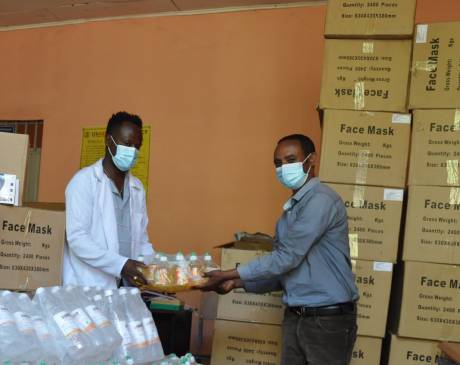 On the African continent, COVID-19 has added to the burden of already under-resourced health systems. There is low testing capacity, lack of trained health care workers and resources to accurately identify, isolate and treat COVID-19 patients, and misinformation regarding prevention, symptoms and treatment circulating within communities.
On the African continent, COVID-19 has added to the burden of already under-resourced health systems. There is low testing capacity, lack of trained health care workers and resources to accurately identify, isolate and treat COVID-19 patients, and misinformation regarding prevention, symptoms and treatment circulating within communities.
Furthermore, with resources being redirected to the COVID-19 response, other essential health services, such as maternal, newborn, and child health and sexual and reproductive health, have been disrupted. Fewer women and children are accessing these critical health services to the detriment of their health. The second wave of COVID-19 is extracting a heavy toll on the continent.
The African continent has seen over 3.9+ million confirmed cases and 106,000+ deaths, according to the Africa Centres for Disease Control and Prevention. A study by the School of Public Health in Lusaka, Zambia, indicates that “the low numbers on the African continent may simply be a matter of lack of testing, with COVID-19 actually taking a terrible but invisible toll across the continent”.
Amref Health Africa in Canada is responding to the COVID-19 pandemic in communities in Ethiopia, Kenya, Malawi and Senegal with $3.6 million in additional financial support from the Government of Canada through Global Affairs Canada. The funding is an extension of our Canada-Africa Initiative to Address Maternal, Newborn and Child Mortality project and is enabling us to implement activities focused on slowing the spread of COVID-19. The project takes an integrated, holistic approach working in collaboration with the various Ministries of Health in Ethiopia, Kenya, Malawi and Senegal to strengthen the health system as well as increase the capacity of human resources for health, such as frontline health workers.
With mandatory lockdowns and social distancing in place at various times in the countries where we’re working, face-to-face training of health workers has been severely affected. With this sudden shift, the question of how to increase the capacity of health workers to screen, detect, and contain suspected cases of COVID-19 without face-to-face training was a key one for us to solve. Several years before the pandemic, Amref Health Africa had developed an innovative mobile technology, called Leap, using simple mobile phones to help educate health workers who were in remote or hard-to-reach communities.
We took the Leap platform and scaled it up for remote COVID-19 training of health workers, limiting the risk of transmission and avoiding the challenge of face-to-face trainings. This mHealth technology has helped to increase the preparedness and response of health workers. As COVID-19 is a new virus and information has been evolving, the mobile platform has also been able to provide continuous updates to health workers. To date, the project has trained over 1,200 facility-based health workers and 7,300 community health workers on COVID-19 prevention, diagnosis, treatment and referrals (data as of Dec 2020).
In addition, the project has procured and distributed personal protective equipment (PPE), and water, sanitation and hygiene supplies for health facilities, facility-based health workers and community health workers and volunteers. The PPE is helping to ensure the health workers are protected when caring for COVID-19 patients. These items have consisted of soap, buckets with taps, N95 masks, gloves, dust bins, eye goggles and hand sanitizer for a safe COVID-19 response. To date, 4,500 N95 masks, 3,000 boxes of gloves (100 gloves per box), 80 dust bins, 300 eye goggles and 6,000 litres of hand sanitizer have been supplied in total (data as of Dec 2020).
Another factor in the fight against COVID-19 is the consistent misinformation and stigma associated with COVID-19. Due to the travel restrictions and the rapid spread of the virus through community contact, the face-to-face interaction and visiting of households done by community health workers has had to be suspended. Prior to COVID-19, these interactions provided vital information on various health issues to community members as well as offered regular monitoring of community members’ health. Instead of relying on household visits, the project has developed key messaging on COVID-19 in collaboration with Ministries of Health and in line with World Health Organization guidelines and has used community radio and local television to help disseminate them. The project has aired the COVID-19 health messages on community radio stations using local languages, reaching over 5.7+ million people. Further, the project has created ads to place on national television and radio stations, as well as social and print media, to reiterate prevention of COVID-19.
In Kenya, the project has engaged youth to learn about COVID-19 and to empower them to reach others and to be involved actively in the dissemination of COVID-19 information using social distance and mask guidelines. To date, 78 youth have been trained and have carried out campaigns in local towns in Siaya, Bomet and Migori reaching 1,345 community members with information on COVID-19 and maternal and child health.
In Ethiopia, 18 community outreaches have taken place, focusing on the key prevention and control messages of physical distancing, proper mask use, and handwashing hygiene. 27 youth, 12 health experts, 24 teachers and 18 religious leaders have been actively involved in conducting the outreach, and 56,201 community members have been reached.
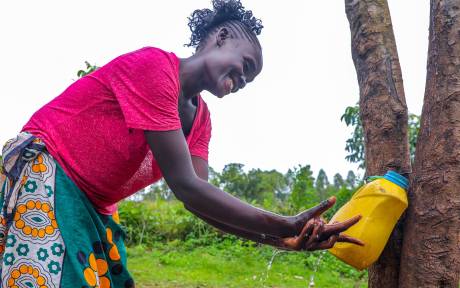 In Malawi, the project has created community engagement strategies on COVID-19 prevention using mobile vans, community sensitization on social distancing, and promotion of tippy taps [a locally-made way to have running water to wash hands without access to a well]. The project has trained 150 Village Health Committee members and 10 village heads in Chitipa district on COVID-19 infection control as well as strategies on engaging fellow community members to prevent the spread of COVID-19.
In Malawi, the project has created community engagement strategies on COVID-19 prevention using mobile vans, community sensitization on social distancing, and promotion of tippy taps [a locally-made way to have running water to wash hands without access to a well]. The project has trained 150 Village Health Committee members and 10 village heads in Chitipa district on COVID-19 infection control as well as strategies on engaging fellow community members to prevent the spread of COVID-19.
Elders and other influential leaders in communities where we are working have been trained on COVID-19 prevention in Malawi. The training has included discussion of gender equality to highlight the importance of women in decision-making at the community level. Since the start of COVID-19, we have observed an increase in gender-based violence. A study by UN Women found that there is an increase in violence against women, and particularly domestic violence, in several countries as security, health, and financial worries create tensions and strains accentuated by the cramped and confined living conditions of lockdown. To help combat the rise in gender-based violence in Malawi, the project has trained community leaders on how to identify and report gender-based violence cases.
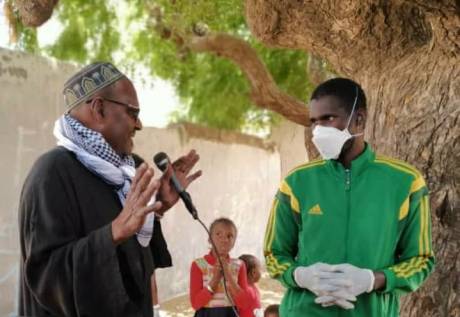
In Senegal, the project is training women as community health workers to carry out sensitization activities among women in communities to provide them with the necessary information and knowledge to seek early health care, to attend promotional and preventive health services and to prevent the transmission and spread of COVID-19 in the home. The community health workers are also contributing to the prevention of sexual and gender-based violence through awareness-raising among women and their spouses.
As the second (and even third wave) surges, countries in Africa are continuing to improve COVID-19 testing and tracing, secure essential PPE and water, hygiene and sanitation supplies, as well as plan massive vaccination campaigns that will need to address vaccine hesitancy, logistics and infrastructure and ensure that there is enough vaccine supplied for the people of Africa.
Ongoing support from Canadians will enable us to continue our COVID-19 response in the communities that need it most

